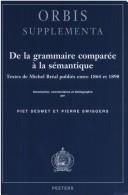| Listing 1 - 2 of 2 |
Sort by
|
Book
ISBN: 9782503568232 2503568238 Year: 2016 Volume: 4 Publisher: Turnhout: Brepols,
Abstract | Keywords | Export | Availability | Bookmark
 Loading...
Loading...Choose an application
- Reference Manager
- EndNote
- RefWorks (Direct export to RefWorks)
This volume offers case studies which reflect the variety of trajectories, concerns, actors and factors that contributed to the fashioning of the postmortem and lasting authority of historical persons in premodern intellectual history: a time span of two millennia. The cultural and religious history from Antiquity through the Renaissance may be read through the lens of the rise and demise of auctoritates. Throughout this long period of about two millennia, many historical persons have been considered as exceptionally authoritative. Obviously, this authority derived from their personal achievements. But one does not become an authority on one's own. In many cases, the way an authority's achievements were received and disseminated by their contemporaries and later generations, was the determining factor in the construction of their authority. This volume focuses on the latter aspect: what are the mechanisms and strategies by which participants in intellectual life at large have shaped the authority of historical persons? On what basis, why and how were some persons singled out above their peers as exceptional auctoritates and by which processes did this continue (or discontinue) over time? What imposed geographical or other limits on the development and expansion of a person's auctoritas? Which circumstances led to the disintegration of the authority of persons previously considered to be authoritative? The case-studies in this volume reflect the dazzling variety of trajectories, concerns, actors and factors that contributed over a time span of two millennia to the fashioning of the postmortem and lasting authority of historical persons.
History of civilization --- Philosophy and psychology of culture --- Social psychology --- Authority --- Specialists --- Authority. --- Specialists. --- History. --- History --- Intellectual life --- Auctoritas (The word) --- Religious aspects --- Christianity. --- Authority - History --- Specialists - History

ISBN: 906831713X 2877232654 9068317318 9789068317138 Year: 1995 Volume: 3 Publisher: Louvain: Peeters,
Abstract | Keywords | Export | Availability | Bookmark
 Loading...
Loading...Choose an application
- Reference Manager
- EndNote
- RefWorks (Direct export to RefWorks)
Filosofie van de Oudheid --- Histoire et culture romaines --- Philosophie de l'Antiquité --- Politiek --- Politique --- Romeinse geschiedenis en cultuur --- Auctoritas (The word) --- Power (Social sciences) --- Authority --- Latin language --- Terminology --- Semantics --- Rome --- Politics and government --- -Latin language --- -Power (Social sciences) --- -Empowerment (Social sciences) --- Political power --- Exchange theory (Sociology) --- Political science --- Social sciences --- Sociology --- Consensus (Social sciences) --- Classical languages --- Italic languages and dialects --- Classical philology --- Latin philology --- Authoritarianism --- Roman law --- Language --- -Auctoritas (The word) --- Terminology. --- Semantics. --- -Terminology --- -Auctoritas (The word). --- Auctoritas (The word). --- -Bréal, M. --- Linguistique comparée --- Lingüística --- Lingüística comparada --- Semantik --- Kontrastive Grammatik --- Comparative linguistics --- Grammar, Comparative and general --- Linguistics --- Academic collection --- Formal semantics --- Semasiology --- Semiology (Semantics) --- Linguistic science --- Science of language --- Comparative grammar --- Grammar --- Grammar, Philosophical --- Grammar, Universal --- Language and languages --- Philosophical grammar --- Comparative philology --- Philology, Comparative --- Grammar, Comparative --- Information theory --- Lexicology --- Meaning (Psychology) --- Philology --- Historical linguistics --- Empowerment (Social sciences) --- Comparative linguistics. --- Grammar, Comparative and general. --- Linguistics. --- Grammaire comparée et générale --- Linguistique --- Semántica --- Sémantique --- Kontrastive Grammatik. --- Semantik. --- Autorité. --- Pouvoir (sciences sociales) --- Imperium (droit romain) --- Auctoritas patrum --- Latin (langue) --- Politique et gouvernement --- Dans la littérature. --- Étymologie. --- Autorité. --- Dans la littérature. --- Étymologie. --- Grammatica --- Taalkunde --- Bréal, M.
| Listing 1 - 2 of 2 |
Sort by
|

 Search
Search Feedback
Feedback About UniCat
About UniCat  Help
Help News
News